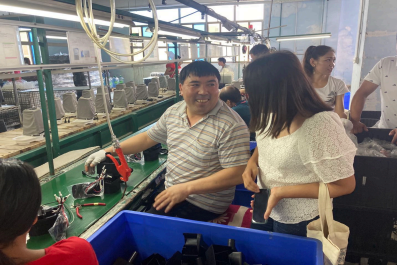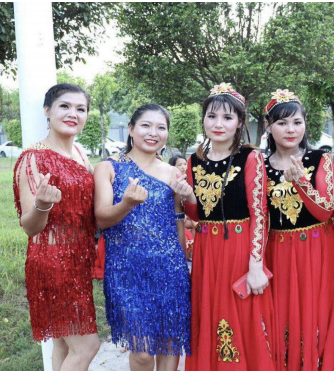02:29

Last year, the Australian Strategic Policy Institute (ASPI) published a report, depicting the "horrible and miserable" situation of people from northwest China's Xinjiang Uygur Autonomous Region. In the report, the author claimed that people from Xinjiang who work in other Chinese provinces are part of the Chinese government's organized mass "forced labor" project, and their human rights are being severely violated.
Yet, a recent field research by Jinan University, one of the oldest universities in south China's Guangdong Province, shows that ethnic minority workers from Xinjiang live normal lives in Guangdong just like that of Han ethnicity, the largest ethnic group of China.
Tuesday's report, titled "'Forced Labor' or 'Pursuit of a Better Life'," investigated five companies in Guangdong Province that employ Xinjiang workers and interviewed a total of 70 workers, including Uygurs, Kazakhs, Kyrgyz, and Tajiks. In the interview, most of the interviewees used their native language instead of Mandarin.
"The report can be said to be the most detailed and comprehensive research so far on the situation of Xinjiang migrant workers in inland China. Plus, both of us come from Xinjiang, so it can also be said to be the most sincere report," said Chen Ning, a visiting research fellow in Jinan University, and also the co-author of the report.

A researcher of Jinan University interviews a Xinjiang Kyrgyz worker in a production workshop in south China's Guangdong Province. /Screenshot from a report by Jinan University
A researcher of Jinan University interviews a Xinjiang Kyrgyz worker in a production workshop in south China's Guangdong Province. /Screenshot from a report by Jinan University
Click here to see the full text:
"Forced Labor" or "Pursuit of A Better Life"? An investigation of Xinjiang minority workers' employment in Guangdong, China
Through their field study, the research found that the workers went to Guangdong for reasons including economic, educational and living environment considerations. Some come to Guangdong to seek higher salaries, broaden their horizons, seek better education for their kids, while others are there because of friends' recommendations.
"I majored in electric power in Xinjiang Agricultural University. After I graduated, I came here for an internship first. I want to raise my income, and of course, I want to see the world and broaden my horizon. The most important thing is to feel the development here," a Tajik interviewee from Kashgar of Xinjiang told researchers.
Another interviewee of Uygur ethnicity was attracted by the humid weather in Guangdong.
"I don't know if you have ever been to Hotan( a prefecture in Xinjiang). It's very dusty there. The dust in Hotan is terrible, while Guangdong is so clean. I haven't stepped on dirt roads here. It's warm and humid all the year round. I don't need to use facial lotion," the report quoted an interviewee as saying.

Researchers of Jinan University organized a focus group interview with ethnic minority workers from Xinjiang. /Screenshot from a report by Jinan University
Researchers of Jinan University organized a focus group interview with ethnic minority workers from Xinjiang. /Screenshot from a report by Jinan University
The research found out that the average annual per capita disposable income of these ethnic minority workers in Guangdong is almost two times of residents in Xinjiang.
For years, Xinjiang has been confronted with drought and desertification, as well as frequent natural disasters such as sandstorms, earthquakes and hail. Restricted by the harsh geographical conditions, the income of locals is much lower than that of inland people and many began to migrate to work in other provinces to seek a better life.
According to the report, the annual average income of ethnic minority workers in Guangdong stands at 55,110 yuan ($8,463) per person, while local Xinjiang residents' average annual per capita disposable income in 2019 was 23,103 yuan ($3,548), which means high salary is one important reason attracting Xinjiang people to work in Guangdong.
A Uygur who in 2018 came to work in Guangdong told researchers that when she heard about recruitment in the province, she was "particularly interested" because her and her husband's salaries were very low, and they didn't have much savings.
"At that time, I heard that the inland salary was very high, and I was told that the minimum monthly salary was 4,000 yuan. So, my husband and I signed up. When I first came to the inland, each person's salary could be more than 4,000 yuan. I have worked for three years. Now I earn more than 5,000 yuan a month, and sometimes 5,300 yuan," she was quoted as saying.

Ethnic minority workers from Xinjiang pose for a picture after a performance as part of their company's cultural activities. /Screenshot from a report by Jinan University
Ethnic minority workers from Xinjiang pose for a picture after a performance as part of their company's cultural activities. /Screenshot from a report by Jinan University
Aside from focus group interviews, the researchers also followed up these workers' daily lives and found that their labor rights are fully protected by the law. They usually work eight hours a day and can get subsidies for overtime work within the scope of the law. They can also take personal leave and sick leaves based on their own needs, as well as off days on national holidays.
Besides, their freedom of religious belief and the right to use their languages are fully respected by these companies. According to the report, companies also provide Muslims with halal food.
"When we came to work here, the company was not familiar with our traditional festivals at first, because we're the first batch of Uygurs working in the company. We told them about these festivals, and they searched them online. Then they learned that these festivals are celebrated in Xinjiang, so they helped us prepare sheep for ceremonies and all kinds of food, from meat to fruit during these festivals," an interviewee told researchers.
The research concluded that as one of Chinese government's efforts to eliminate poverty across China, recruiting Xinjiang people to work in inland cities is based on their own wishes. The practice has not only improved Xinjiang people's salaries, but improved their vocational and language skills. More importantly, when they work outside of Xinjiang, their human rights are fully protected.
"The research confirms that there is no so called 're-education camp,' 'forced labor,' or 'surveillance' as is claimed in the ASPI report in any aspects of the employment of the ethnic minorities from Xinjiang," read the report.
(CGTN's Sun Ye also contributed to the story.)

